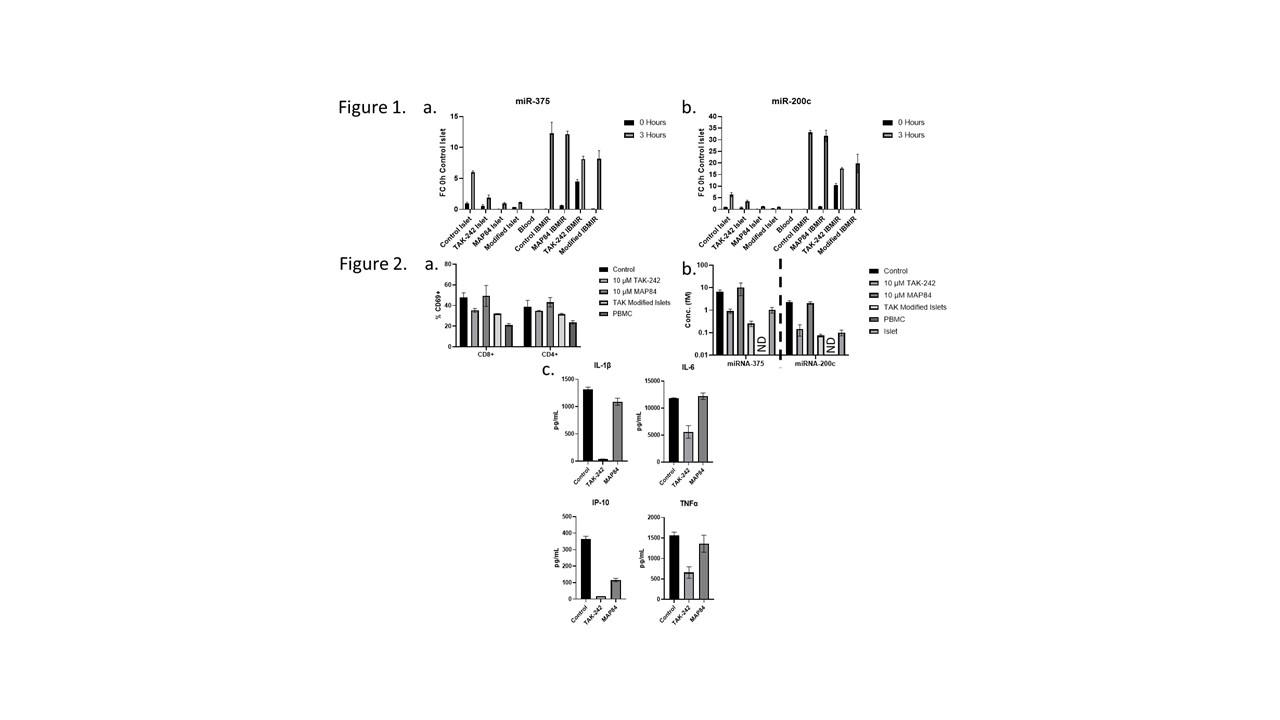Small molecule inhibitor of toll-like receptor 4, TAK-242, attenuates islet damage due to IBMIR and immune responses
Jordan Mattke1,2, Robert Kane1, Michael Plunk1, Bashoo Naziruddin2.
1Institute of Biomedical Sciences, Baylor University, Waco, United States; 2Simmons Transplant Institute, Baylor Scott and White, Dallas, United States
Introduction: Immediately following transplantation into the portal vein, islets are subjected to stresses of the instant blood mediated inflammatory reaction (IBMIR) as well as innate immune responses leading to loss of viability of transplanted tissue. Previous work in our lab has demonstrated that inhibition of toll-like receptor 4 (TLR4) during isolation and transplantation leads to superior transplant outcomes in syngeneic models. In this study we investigated whether small molecule inhibitor of TLR4, TAK-242, is able to attenuate IBMIR as well as early immune responses in vitro leading to decreased islet damage signifying for favorable transplant outcomes.
Methods: In Vitro IBMIR: Purified human islets were mixed with whole allogenic blood, and plasma was collected immediately after mixing as well as after 3 hours of mixing at 37⁰C. miRNA was isolated from serum and stress and damage miRNA-375 and miRNA-200c were quantified by RT-qPCR. PBMC were mixed with isolated islets in an in vitro mixed lymphocyte culture. Islets were removed and preserved in histogel while remaining PBMC were analyzed by flow cytometry to monitor immune activation. Cytokines and miRNA in cell culture supernatant were analyzed by Luminex assay and RT-qPCR respectively.
Results: When islets were mixed with whole allogenic blood, we observed a significant increase in stress and damage associated miRNA-375 and miRNA-200c (Figure 1). This response was significantly dampened by TAK-242 indicating a decrease in islet damage due to IBMIR. In an allogenic co-culture model of islets and PBMC, the addition of TAK-242 resulted in more intact islets following co-culture as well as decreased activation of T cells via CD69 expression (Figure 2a). This weakened immune response was also echoed by the attenuated production of pro-inflammatory cytokines IL-1β, IL-6, IP-10, and TNFα (Figure 2c). Cell culture supernatant also showed decreased expression of islet stress and damage miRNA-375 and miRNA-200c further supporting superior outcomes for inhibition of TLR4 in an in vivo model of islet transplantation (Figure 2b).
Conclusions: Taken together, these results support the conclusion that inhibition of TLR4 preserves islet viability and function following transplantation into the portal vein by reducing the detrimental effects of IBMIR and immune activation .This further validates the application of TAK-242 in an in vivo setting to evaluate improvement of graft survival after islet transplantation.
